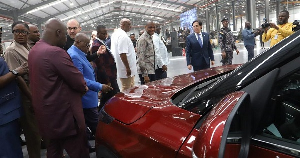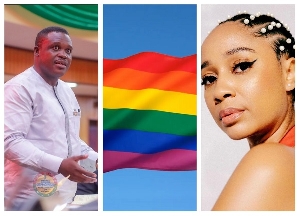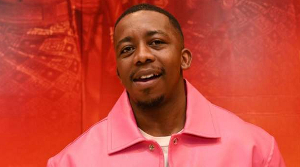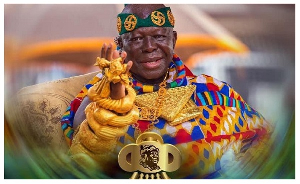Diasporia News of Monday, 2 April 2007
Source: dr. agyenim boateng
Ghana@50 in Louisville, KY
GHANA: THE PAST, PRESENT AND THE WAY FORWARD
Guest Speaker’s address by Dr. Agyenim Boateng, at Ghana @50 in Louisville, Kentucky
When your president Sam Asamoa invited me to speak here at his function he indicated that I will speak between 15-20 minutes and should present very positive themes in. The address should be devoid of any political leanings that will be considered harsh on any of the current political parties in Ghana. This is a fair demand but as our Nigeria brothers say “I beg oo”, how can I competently handle such an important topic without reflecting on some issues which had shaped or affected the destiny of our country in the past fifty years?
My role is not to disparage any political party or leader or offend the sensibilities of some of you. Fortunately , I have lived through these fifty years and as our elders say “tete wo bi ka; tete wobi kyere” My role is to share with you some experiences I have garnered in those years and weave some perspective into the fabric of Ghana’s tortuous journey through the post independence fifty years.
As a school boy, I was present at the of Prince of Wales Park in Kumasi at the midnight of March 6, 57 , now part of Kejetia Kumasi where there was a mighty firework display to usher in the new Ghana. So enthralled and inspired by the brilliant rocket explosion that I went home that night dreaming on the new Ghana our leaders had promised us. We thought independence was going to bring us literally manna from heaven. In fact for a time it kept cropping in my head the melody of then CPP campaign song “Land of our birth we pledge to thee; when we are grown, we are going to take our place as men and women of our race. Parallel to this was the patriotic song of Ephraim Amo's “Yen are yen asase ni… “
Ladies and Gentlemen: The historical evidence is that after 50 years, Ghana has not realized the full benefits of its independence or the founding father’s vision of Freedom and Justice. Like the wandering Israelites who could not make it to the promise land on time due to their transgressions, we are still running into obstacles and set backs along the country’s journey. What happened? Here is where some of us may engage in a philosophical disagreement on the cause and effect of our predicament. However all of us will stipulate that our journey has encountered some unpleasant and some near tragic experiences. From my experience and perspective, let me share with you some few historical insights.
Within a time expanse of fifty years of independence, Ghana has experienced four military coups that have usurped a total of 32 years of the fifty years. All these have stunted our growth of constitutional democracy, rule of law and socio-economic viability. Between 1983 and l995 the economic conditions became so bad that nearly 2 million of Ghanaians literally voted with their feet, in order words migrated, to seek the greener pastures else where. Some of us here are an integral part of that exodus now known as Ghana Diasporans or Overseas Resident Ghanaians
We should not dwell too much on the historical past lest we be held as hostages by history. Rather, let us dwell on what we can do to make life better for us our children and the next generation in the coming fifty years. Against the background of our country’s tortuous historical journey, let me point out some few land marks that may be used as guide for our journey into the future.
The first President Kwame Nkrumah laid the foundations for our infrastructural development by building road’s, hospitals schools and instilling in us our see of pride as Africans. When he and his CPP government turned the country into one party state symbolized by the substitution of the party’s red, white and green flag as the national flag instead of the national colors of red, gold and green with the black star in the center Parliament followed this up by making him as president for life. Among other political/economic controversial issues, Generals Afrifa and Kotoka stepped in with a coup which in turn ushered in Prof Busia’s PP government. Though his administration was short lived, Busia laid out the foundation of our modern democracy, rural development, and governmental decentralization and rescued the economy form the control of foreigners. Gen Acheampong who over threw Busia’s government came in with “operation feed your self” and also expanded the economy. The next was President Limann whose attempt to broaden the democratic foundation was short cut by Pres. Jerry Rawlings’ coups of 1979 and 1981. One important legacy of the PNDC regime was it sponsoring the 1992 Constitution which laid down the legal frame work of our current democratic dispensation. Pres. Kufour’s NPP government is broadening the depth of democracy by offering good governance rule of law as well as stabilizing the economy. Against the backdrop of the topsy turvy world Ghana has passed through, and being a little sanguine, I have spin on some of the positive landmarks left along the road by the various military and civilian regimes that that have lead Ghana in her fifty years journey. Don’t let us loose sight of them as we look and move forward to the brighter future.
As I mentioned earlier, some of the historical circumstances that brought about massive exodus of some of our educated elites and other employable to foreign countries due to the repressive economic climates between 80 and 90s. President Kufour in his address at the Golden Jubilee celebration at Independence square in Accra acknowledged the “anonymous” Ghanaians who have contributed to the rebuilding of Ghana. However, without contradicting the President but embellishing on his acknowledgement, let us also give credit to the Ghanaian Diasporans, among the “anonymous” who have contributed and are still contributing enormously to the rebuilding of our Ghana. These Ghana Diasporans were the back bones of sustaining the economy during the dark days. Who can forget about the cars, trucks and other heavy machinery sent from Germany and Europe when the whole transportation system of the country broke down between the 80’s and 90’s? At present, on any visit to the suburb of Accra, Kumasi and other urban areas one cannot be but impressed by all those massive buildings that dot the landscape of most of our cities and other towns. Doesn’t our Ghanaian Diasporan deserve some measure of credit?
The Bank of Ghana latest statistics , also corroborated recently in London by President Kuffour, shows those remittances to our home country in 2006 was over ($ 5) billion dollars last year thereby making it over one third of our total export earners. Even though these remittances go directly to our families and/or for buildings purposes, as some may argue, however, it is undisputed that all have had the unintended consequences of stabilizing the economy by making our Cedi stronger, alleviating more than five percent of poverty by providing safety nets, raising national income and stimulating investments. When did the last time the Cedi fall against the dollar? Over six years ago. This goes to show that even though we are not home, we have not abandoned our country, as our home critics like to point out.
The next 50 years calls for our country to use all material and human resources to modernize and meet the challenges of globalization. The time has come for the country leadership to harness the skills and expertise of all her citizens both at home and Diaspora for development. In this regard the passage of ROPAA in 2006 by our Parliament to enfranchise over seas resident Ghanaians is a first step and in the right direction of integrating her citizens into the main stream and empowering them to have a say so in the way governments are elected.
Lots of position papers have been written and lots of speeches have been given on the best way to utilize and integrate the resources, skills and expertise of Ghanaians. However, no mechanism has been set in place except to exhort Diasporans to come home and contribute. Until a legal and institutional frame work is set up to deal with these problem mere exhortations will be simply dismissed as “talk shops” or rhetoric. As a start, I suggest the creation of a Ministry of Diasporan Affairs or precisely Ministry of Overseas Ghanaian Residents, MOGR ( since Mr. Jake Obetsebi Lamptey’s Ministry of Tourism and Diasporan Relations evidently caters to only black foreign tourists to Ghana) to set up the legal and institutional frame work. I am sure if special ministries cater to such groups as women/ children, tourism or fisheries the creation of such an important MDA will be a welcome and useful addition.
At present, there are some fundamental road blocks which have to be removed, first, if the government is sincere about wanting overseas resident Ghanaians to contribute to national development. I am drawing your attention to Article 16 (1) of the Dual Citizenship Act that came into force in February 2001. Among the provisions there are about 12 categories of senior level positions in the public service in the Executive, and Judiciary branches of government which are legally out of bounds for us . In addition, none of us can run for a Parliamentary seat even though we are eligible to vote in the ‘08 elections. Some of you might have read on the plight of Mr. Akwesi Agyeman Prempeh, a former resident of Washington DC whose appointment as Deputy Regional Minister was rejected by Parliament on account of his being a dual citizen. Such a rejection was not symbolic but affects your future, my future and our children’s future. Paradoxically, such discrimination does not exist in Nigeria against her citizens who have dual nationality. A “Nigerian by birth” is all that is required for them to enjoy all the privileges and immunities guaranteed by their constitution. Therefore, fellow Ghanaians, it is now time for us to come together to fight against such unjust discrimination. Our Constitution has guaranteed us equal rights and protection as Ghanaians pursuant to Article 17 (1) and (2).
So let the government and our political leadership go beyond the rhetoric of “you all come” home or “monyiraa mo mmra fie” but first formulate a legal and institutional frame work to competently deal with and incorporate us into the mainstream for we have lot of talents, expertise and resources to contribute to the development of our country. What we want, first, is a legal standing and equal playing field as Ghanaians.
The next fifty years toward Ghana’s first centenary offers a daunting and challenging task to develop our country, socially, politically and economically as well as deepen the parameters of democracy and its institutions which have merged at the terminal phase of this fifty years. In the coming 50 years, we owe it to ourselves as citizens to develop our nation at par with the rest of the developed international community.
To you the young ones present here tonight, this is also your challenge. To nurture the flame of freedom, democracy and uplift our country to world standards. In spite of our short comings in the past fifty years, we have a lot to be grateful for. Our country did not implode at its trying times, and collectively we survived and we are going to be stronger. According to Fred Nietzsche, what does not kill you makes your stronger. There is more to be done and achieve in terms of development, so let’s pause for a moment, thank the almighty God and congratulate ourselves for keeping together a nation for ourselves
It is my hope and prayer that the next 50 years unleashes our creativity, capabilities, potentials and above all "innovativeness" in our country’s endeavors to take her rightful place among the commity of nations.
******
The speaker: Dr. Agyenim Boateng is an Assistant Attorney General Commonwealth of Kentucky










